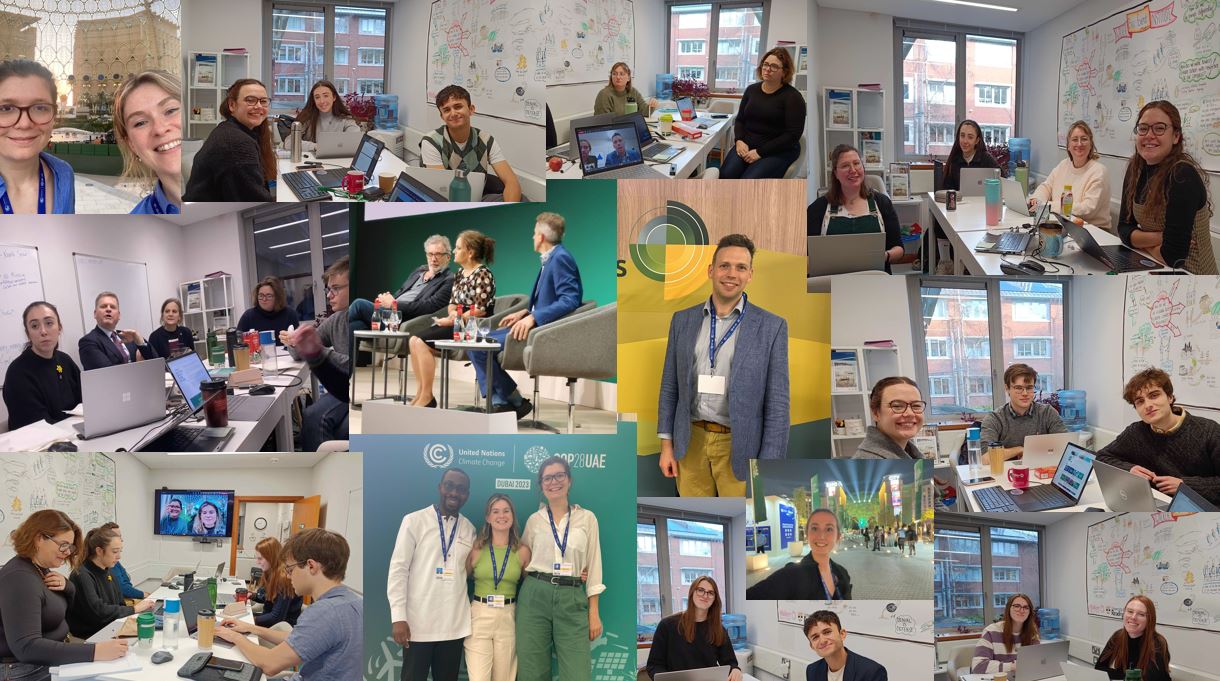
The seventh COPCAS took place during COP28 between the 30th of November and 12th of December 2023 which was hosted in Dubai, United Arab Emirates. This year, 13 PhD students took part in this COPCAS from the Scenario and FoodBioSystems Doctoral Training Partnerships.
During COP28 itself, an updated, and dedicated space was made available for the COPCAS course in the Walker Institute, with face-to-face support from one member of the Walker Team during each session. Every weekday and one Saturday during COP28, the Climate Action Studio was open from 08:45 am until 17:00 pm. Students from the Climate Action Studio connected with students attending COP28 in Dubai via MS Teams calls twice a day. Students on the ground provided updates on the issues arising every day and reported on sessions they attended as well as the general vibe of COP28.
This year the COP Climate Action Studio was run as a virtual Newsroom where students were encouraged to chase down leads and craft engaging stories around their research interest and the climate policy events unfolding at COP28. For this purpose Dr Harley Pope created a virtual whiteboard / Mural Board which allowed students participating on different days to request specific content for participants on the ground at COP28, develop stories, and share outputs – both amongst themselves and with students not present on that specific day. You can view the Mural board here.
 During the Climate Action Studio, the students in Reading engaged remotely with COP, watching sessions via the official COP28 platform, conducting interviews, and discussing the issues they encountered on the day. They were also encouraged to write blog articles for topics which interested them and/or related to their research. These blog posts were proof-read by the Walker Team, and then posted on the Walker Website, helping students develop their writing skills and improving their exposure. All blogs were shared with the University of Reading press office and publicised from the official media platforms. Students also created short video updates at the end of every day, which were shared with the wider University community, and used within COPCAS to inform participants of the developments of the day.
During the Climate Action Studio, the students in Reading engaged remotely with COP, watching sessions via the official COP28 platform, conducting interviews, and discussing the issues they encountered on the day. They were also encouraged to write blog articles for topics which interested them and/or related to their research. These blog posts were proof-read by the Walker Team, and then posted on the Walker Website, helping students develop their writing skills and improving their exposure. All blogs were shared with the University of Reading press office and publicised from the official media platforms. Students also created short video updates at the end of every day, which were shared with the wider University community, and used within COPCAS to inform participants of the developments of the day.
The UNFCCC streamed panel and side events. Additionally, in a separate area of their website, it was possible to watch plenary events, a range of ‘special events’ and press conferences. The streamed sessions remain available for a short amount of time on the website. There was also a dedicated YouTube channel which was easier to navigate. Some pavilion events were also streamed live and were accessible via YouTube or via their official webpage.
This year we also introduced the idea of creating short videos that captured the most important points of the day. Students were enthusiastic about sharing their experiences and what they had learned from those attending the conference in person, with the wider University community. All videos students created can be viewed in the COPCAS webpage.
The Walker Institute had valuable support from the Digital Campaigns and Engagement team from the University of Reading. We would like to extend our gratitude to Pete Castle, Ben Warden, Sasha Fitzgerald and Sara Lovejoy for providing students with insights into the workings of a newsroom and filming short videos for non-academic audiences. The DCE team edited all short videos students created and posted them in the University social media.
The COPCAS 2023 cohort comprised students from the SCENARIO DTP and FoodBioSystems DTP. They covered all thematic days with fervor, conducted interviews with people from different disciplines and produced high quality blogs. You can access these blogs on the Walker Academy COPCAS 2023 webpage.
The value of having dedicated time and sharing this experience with other students through the COP process was noted by several students:
“there are so many events happening at COP it is difficult to keep up/track, but having someone you know there who you can talk to about their personal experiences is much more engaging than following along through external news channels.”
“having the dedicated space and allocated time to do this made me focus and having the support was great help.”
“I think the experience of working in a “news room” and placing my research and interests with respect to wider climate movements has been very valuable and a good skills development tool.”
Hannah Case, from the FoodBioSystems Doctoral Training Programme, who attended COP28 in person shares her experience in the video below:
Alex Moores, a PhD student from FoodBioSystems Doctoral Training Programme, who attended COP28 remotely from the Climate Action Studio created the following video on how he experienced COP28:
A great thank you to all the students who attended the COP Climate Action Studio this year! Their enthusiasm was contagious.

